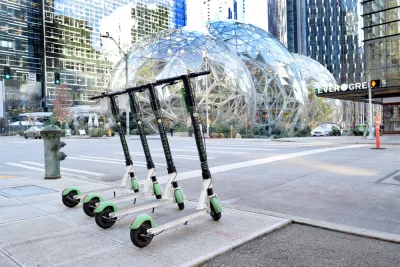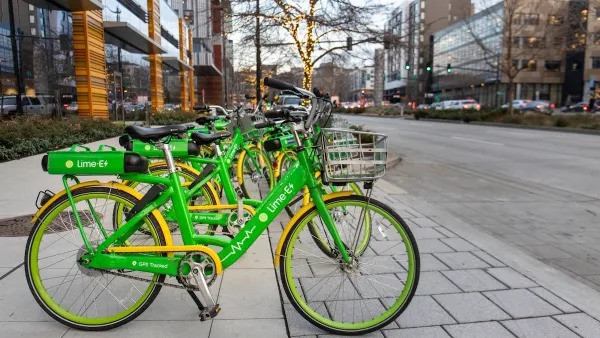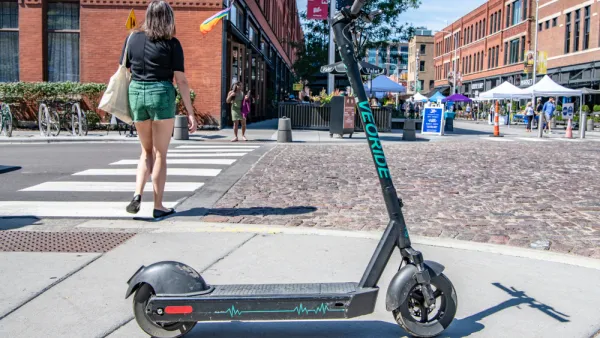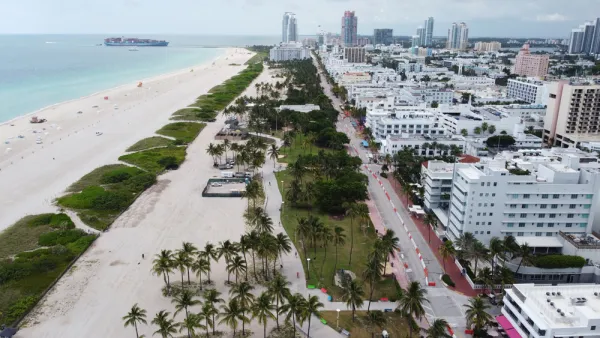The city’s shared e-scooter program has proved popular, seeing more than eight times as many rides as its bike share system.

Amanda Zhou reports on the success of Seattle’s electric scooter pilot program, which allowed four private companies to operate scooters in the city starting in September 2020. “Over 1.4 million trips were taken by 260,000 riders during the pilot program between September 2020 and October 2021, with the initial fleet size of around 1,500 colorful devices growing to 5,000 citywide, according to a report recently released by the Seattle Department of Transportation.”
Since the program’s launch, “the number of scooter trips has outpaced the number of rides taken using the city’s mixed fleet of pedal and electric bikes, according to SDOT. In September, Seattle saw just under 300,000 scooter trips compared to about 35,000 bike trips.” More than three quarters of riders used scooters for recreational purposes and errands, while almost a quarter said they used scooters as part of their commute. “About one-fifth of respondents said they used scooters to connect to transit and more than half said they would have used a personal vehicle or taxi if the scooters weren’t available.”
Some city council members expressed lingering concerns about the safety of the devices. “SDOT examined police reports and found 17 collisions, the vast majority of which occurred between a scooter and a vehicle. Five of those cases resulted in ‘serious’ injuries and one was fatal,” the article notes. But infrastructure plays a role, too: “Riders attributed factors like poor weather, road conditions like potholes and raised pavement, and interactions with other drivers.”
The report also highlights the success of the reduced-fare program, while acknowledging that not enough users seem to be aware of the program. “Reduced-fare scooter riders represent less than 1% of all riders but take about 4.5% of rides. Reduced-fare riders took an average of 64 trips per person compared to around three trips per rider overall.”
FULL STORY: What Seattle learned from one year of electric scooters

National Parks Layoffs Will Cause Communities to Lose Billions
Thousands of essential park workers were laid off this week, just before the busy spring break season.

Retro-silient?: America’s First “Eco-burb,” The Woodlands Turns 50
A master-planned community north of Houston offers lessons on green infrastructure and resilient design, but falls short of its founder’s lofty affordability and walkability goals.

Delivering for America Plan Will Downgrade Mail Service in at Least 49.5 Percent of Zip Codes
Republican and Democrat lawmakers criticize the plan for its disproportionate negative impact on rural communities.

Test News Post 1
This is a summary

Test News Headline 46
Test for the image on the front page.

Balancing Bombs and Butterflies: How the National Guard Protects a Rare Species
The National Guard at Fort Indiantown Gap uses GIS technology and land management strategies to balance military training with conservation efforts, ensuring the survival of the rare eastern regal fritillary butterfly.
Urban Design for Planners 1: Software Tools
This six-course series explores essential urban design concepts using open source software and equips planners with the tools they need to participate fully in the urban design process.
Planning for Universal Design
Learn the tools for implementing Universal Design in planning regulations.
EMC Planning Group, Inc.
Planetizen
Planetizen
Mpact (formerly Rail~Volution)
Great Falls Development Authority, Inc.
HUDs Office of Policy Development and Research
NYU Wagner Graduate School of Public Service





























